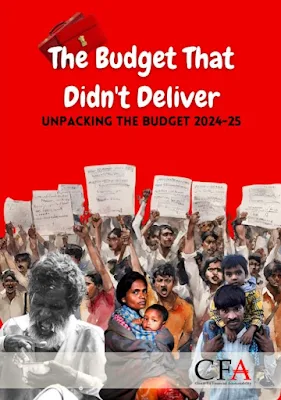Counterview Desk
In a comprehensive report on the Union budget, the advocacy group Centre for Financial Accountability (CFA) has regretted that it "continues to appease the corporate world, after corporate tax cuts and write offs of bad loans, in addition to the tax holidays, production linked incentives." This despite the fact that wealth inequality is fast widening, household debt is high, private investments are at a low with no demand in the market, and rural distress is exacerbated by "alarming crisis in the farm sector," says a CFA note based the report.
Text:
The first budget of the NDA government seems to have heavily constrained with coalition compulsions, attempt to recognise the real issues on the ground and a response to the Mandate 2024. Yet, it manage only lip service to the real issues than addressing them.
The context in which one approached this budget is significant. The economy has not recovered from the mindless demonetisation, ill-conceived GST and a reckless lockdown, breaking the backbone of informal sector which employs nearly 90% of the work force. Inflation and unemployment are at its peak as never before. Wealth inequality is fast widening. Household debt is high.
Private investments are at a low with no demand in the market. Rural distress is exacerbated by a combination of factors. The alarming crisis in the farm sector, characterized by low farm incomes and mounting debt burdens among farmers, among other reasons, begs the attention of the governments for long. Climate emergency resulting in extreme weather conditions, floods and destruction is on the rise. Health and education sectors are reeling under neglect and insufficient funding.
Yet, on each of these counts, the budget failed to adequately address them.
The word rights doesn’t appear once in the budget speech. The word welfare once. And the word inflation only thrice in a para at the beginning. The word temple appears more than twice the number of times the word inflation. After being in a state of denial, the word employment is mentioned 33 times. However, how an internship, whilst ill-conceived, can replace employment is unclear.
As Prof Arun Kumar says, “For job creation there is need to encourage labour intensive areas as opposed to capital intensive areas. But allocation to MGNREGS has not been increased so in real terms it is going to be less than last year.”
The Finance Minister in fact pats her own back on our supposedly better handling of prices at a time when the poor are feeling under dwindling income, joblessness and high prices. And most certainly the inflation crisis cannot completely be externalised.
The budget and the economic survey alludes to a banking miracle, but it carefully keeps quiet about the magic wands of write offs (Rs14.56 lakh crores between 2014-23) and haircuts used to achieve the so called miracle.
Continuing to appease the corporate world, after corporate tax cuts and write offs of bad loans, in addition to the tax holidays, production linked incentives and others, corporate tax on foreign companies has been reduced from 40% to 35%.
The climate commitments and our energy strategy seem to be at loggerheads and the path is being cleared for further debilitating and environmentally threatening projects. Even in the name of renewables, the strategy being worked out seems dubious an fraught with questions.
The word rights doesn’t appear once in the budget speech. The word welfare once, inflation thrice, temple 6 times
As the analysis shows, despite repeated railway accidents in recent times, resulting in many deaths of ordinary Indians and CAG’s 23rd report of 2022 alluding to the requirements of Rs 1.03 crore for track renewal, the proportion of the railway budget allocated to safety has stagnated or declined as a percentage of total expenditure since 2018-19.
Once taunted as an “ATM For U-Turn Babu” (Chandrababu Naidu) by the Prime Minister, he himself making a U-turn this time, has announced financial assistance for Polavaram project. Displacement of over 40,000 families with nearly 50% of them being adivasis, and environmental issues, loss of farmland, archaeological sites and even a wildlife sanctuary cannot be a concern to this government who would go to any extend to win-over the coalition partners to ensure their survival.
Amravati Capital City Project, from which both the World Bank and the Asian Infrastructure Investment Bank withdrew in 2019 due to large social and environmental negative impacts is now supported handsomely.
The other key coalition partner, JD(U), managed to get a large package of Rs. 59,000 crore, while a lot of other states are ignored. But nobody knows what happened to the Rs. 1.25 lakh crores announced by the Prime Minister in 2015 as a special package to Bihar.
As the statement by the New Trade Union Initiative says:
“The BJP firmly believes the economy can only grow with the rich growing richer. For the rest, as the ES (Economic Survey) goes to great length to say, we must work harder, we must work longer hours, and we must give up on our overtime pay. The lack of long hours of work and the high overtime according to the BJP government are holding productivity and the economy back. The BJP believes the country’s working class, both men and women, are a fetter to economic growth. It is this BJP that is our government. We the people, deserve a better government.”
---
*Click here to download full report



Comments